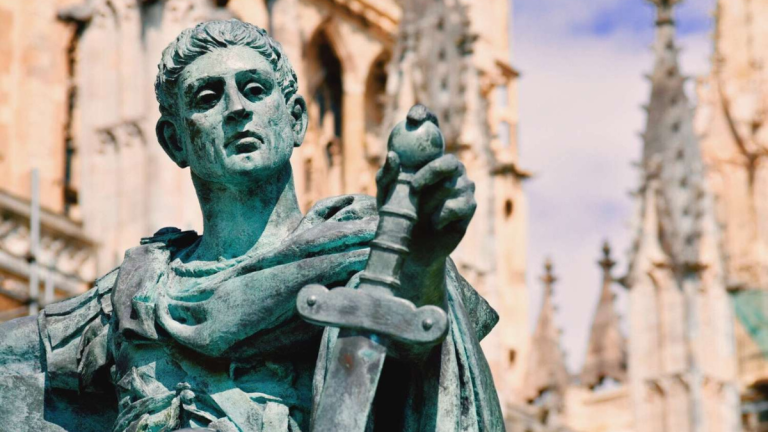Seventeen hundred years ago this year, Constantine defeated his co-emperor Licinius, ending a series of civil wars and consolidating his power as sole emperor of Rome. At the time, Christians saw it as the defeat of ancient pagan practices and the triumph of a new Christian vision of Rome.
Constantine’s turn to Christianity began before he abandoned Roman paganism. His children had been mentored by Lactantius, a Christian who opposed forced worship and defended religious freedom as long as religious practice did not disrupt public order. Years later, in 312, while Constantine was fighting a rival, he claimed to have had a vision of a symbol of Christ with the words “in this sign, conquer.” He asked his soldiers to paint the symbol on their shields. Constantine won the battle and converted to Christianity. The following year he issued the Edict of Milan, which declared religious freedom throughout the Empire in terms Constantine had learned from Lactantius.
Constantine has been a controversial figure throughout Church history. The authenticity of his conversion and its impact on the Church have been constantly questioned and scrutinized. Many believe that Constantine’s actions to bind the Church to the empire compromised the Gospel. Often these arguments are based on a misunderstanding of what Constantine did and do not take into account the consequences of the legalization of Christianity.
The Edict of Milan legalized Christianity, as well as other religions. He did not declare Christianity as the official imperial religion. Although Constantine’s promotion of Christianity made it more popular, it was not named an imperial religion until 380 by Emperor Theodosius I. Even then, Theodosius did not suppress paganism.
Despite what you may have read online or seen in The Da Vinci Code film, Constantine did not dictate doctrine to the Church. When he called the Council of Nicaea In 325, to deal with the question of the nature of Christ, a controversy which threatened to tear the Church apart, he fulfilled a traditional function of Roman emperors who often served as mediators in religious conflicts.
Despite claims to the contrary, neither Constantine nor the Council of Nicaea had anything to do with the formation of the canon of Scripture. Constantine did not control the discussion at Nicaea, nor dictate its outcome. And even if he had tried, many bishops present at the council had been tortured by his predecessor Diocletian. If they did not compromise their faith, it would be foolish to assume that they would turn to Constantine.
The most direct result of Constantine’s conversion was an end to the persecution, torture, and execution of Christians. Obviously this was well received by the Christians of his day, but it should also be recognized as a historical good.
The Edict of Milan also promoted Christian evangelization. Before Constantine, the Gospel had spread to India, Armenia, and Persia, then from Persia through Central Asia to China in the early 600s. The legalization of Christianity led to the founding of churches throughout the Roman Empire and sending missionaries to areas outside the empire. Saint Patrick was a Romanized Briton who grew up as a Christian and brought the Gospel to Ireland. In the 5th century, a Syrian Christian named Frumentius converted the king of Aksum in modern Ethiopia. Together they evangelized this kingdom. Cyril and Methodius brought the Gospel to the Slavic peoples of central and eastern Europe in the 9th century. The evangelization of these regions can be attributed to the actions of Constantine.
Of course, the legalization of Christianity sparked a bitter struggle between church and state. Because this faith had existed for centuries as an illegal and sporadically persecuted minority religion, the Church operated completely independently of the state. With Constantine new questions arose, such as: what properly belongs to Caesar and what belongs to God?
This question remains at the heart of Western political thought today. Even given the historical difficulties that arose from his conversion, we can thank God for Constantine and for the freedom of faith and gospel that he established.
This Breakpoint was co-authored by Dr. Glenn Sunshine. For more resources for living like a Christian in this cultural moment, visit breakpoint.org.


